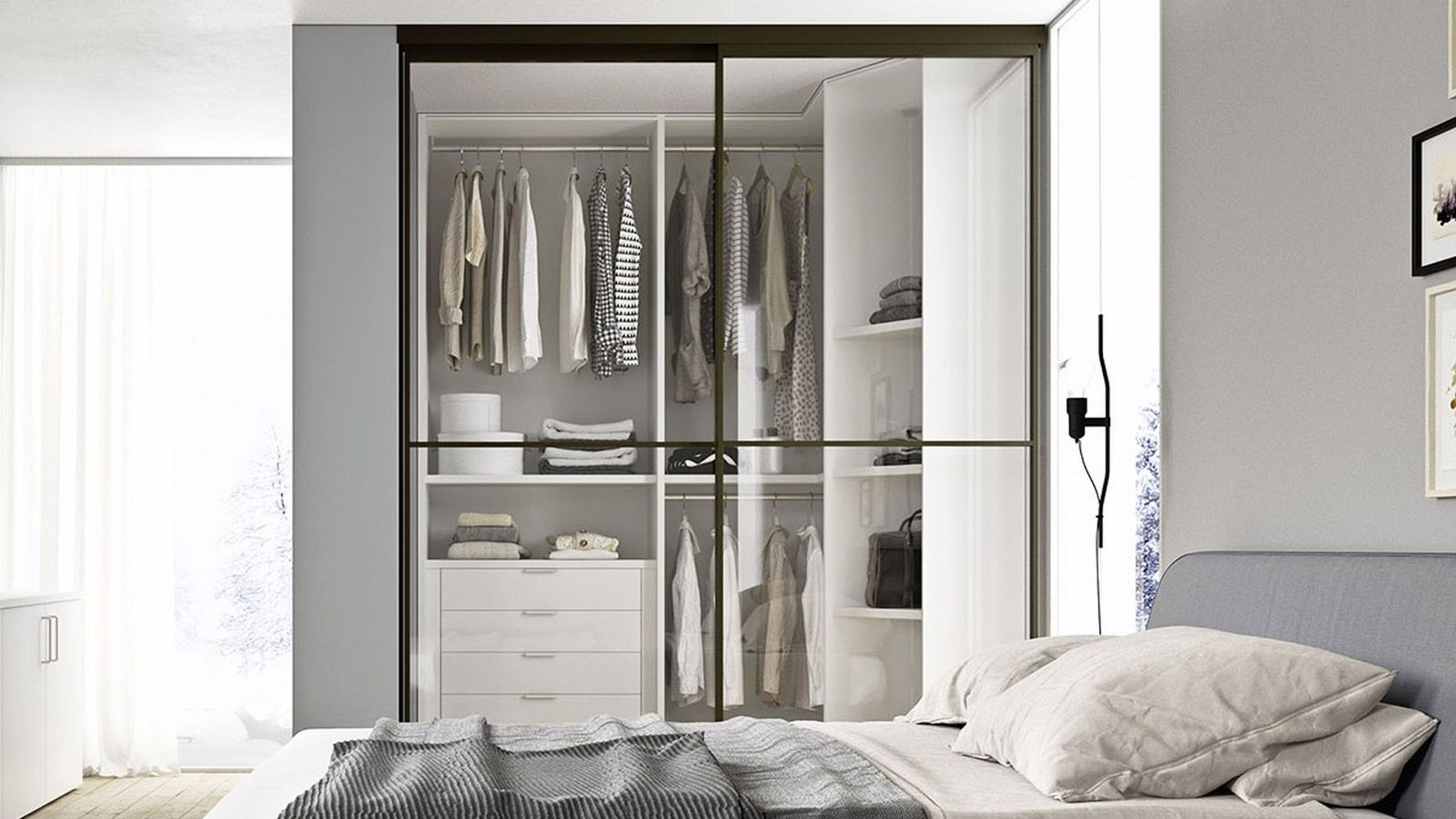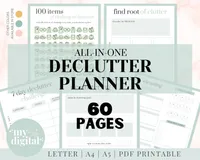How to make decluttering fun – 7 simple solutions to make it less of a chore
Decluttering doesn't have to be a drag – here’s how to make it more fun


- 1. Make decluttering a game and involve the family
- 2. Set a timer and challenge yourself
- 3. Make it into a family challenge
- 4. Delineate the decluttering process with a task basket
- 5. Use music or TV as a positive distraction
- 6. Use dice to switch up your approach to decluttering
- 7. ‘Hire’ a friend to help
- FAQs
Decluttering can be incredibly overwhelming – or just downright boring – but how do you make it fun?
Professional home organizers do their job for a reason, after all. They enjoy both the process and the end result, but there is more to it than simply having some effective decluttering tips up their sleeves.
Here, professional organizers have explained how to make decluttering fun to spur your home clear out without draining you of energy.
How to make decluttering fun
If you often find yourself decluttering when you feel overwhelmed, and struggle to find joy in the process as it is, try out some of these methods to find which one works best for you. It is good to note that not every method will help everybody the same, so there is an element of trial and error.

1. Make decluttering a game and involve the family
There are several decluttering games you can try out to make decluttering a little more entertaining, such as the 30-day Minimalism game, or the roll-the-dice chore game.
Kirsten Fisher, home organizer, founder, and CEO of Imagine Home Organization suggests turning it into a race:
‘Race yourself or a family member, with each of you choosing a comparable space, and see who can get the contents sorted first,’ she suggests. ‘Then see who can finish their edit first. This has the bonus result of not allowing people to get too stuck in their heads deciding if they need to want or love something because there is no time for that.
Design expertise in your inbox – from inspiring decorating ideas and beautiful celebrity homes to practical gardening advice and shopping round-ups.
‘It is important to note that this won't work for anyone who has anxiety about the editing process or feels sad or nostalgic about the things they are reviewing,’ she adds. ‘Some things do require a bit of time and thought so be sure to take that into account before you start.’
2. Set a timer and challenge yourself
If you are working alone, then challenging yourself can be a great way to prove to yourself that you are far better at decluttering than you think. By creating a decluttering checklist and setting a timer, you will often find tasks don't take as long as you thought they would, continues Kirsten Fisher, home organizer:
‘Sometimes the hardest part is thinking the process will take forever. But set a timer for 30 minutes and then reward yourself when you are done. When you realize it wasn't that bad, you can set another timer when you have had your reward.’
Alternatively, you can also take inspiration from the Just One Song organizing method, and see how much you can declutter before your favorite song ends.
All-in-One Declutter Planner | $3.92 at Etsy
This printable decluttering planner is all you need to help tackle your home's mess without missing a step. It is perfect for both keeping on top of your belongings and starting off on your first big clearout.
3. Make it into a family challenge
If you are not so great at challenging yourself, or want to make sure you are not the only one doing all the hard work, then you can challenge your family and make it into a competition to encourage family to declutter.
‘Make a game of using everything up until it's completely gone,’ suggests Bonnie Borromeo Tomlinson, professional home organizer and author of Stop Buying Bins, available at Amazon. ‘All the toothpaste, all the crayons, all the cereal. And then try to make do with what you have before buying more. Use your travel toothpaste in your toiletry bag, use purple instead of blue for your artwork, and try eating a different breakfast by being creative with the ingredients you have on hand. It stretches the mind at the same time,’ she says.
Just be sure to set a ‘no cheating’ rule to make sure people aren't using more than what they need of a product just to get rid of it.
‘With small children, sing during chores then sit back and describe the beautiful job they did,’ Bonnie adds. ‘Show them, not tell them, that working and living in a clean and organized home is a source of energy and joy.’

Bonnie Borromeo Tomlinson is the author of Stop Buying Bins & other blunt but practical advice from a home organizer. She was the principal of Bonnie Lia Interiors, a home organizing and interior decorating firm with clients in MD, VA, DC. She has also held positions as a senior national media buyer, museum store retail buyer, and home decor account manager. Since 2020, she has focused her attention on writing full-time.
4. Delineate the decluttering process with a task basket
Boxes and bins have always been handy when it comes to decluttering – from the maybe box decluttering method to the five messes decluttering technique. Minda Hofer, lead organizer and owner of Labeled Living suggests an alternative that doesn't require you to declutter everything in one fell swoop, however:
‘I love the concept of The Task Basket. This is a basket that is pretty to look at but holds all of the not-so-pretty items. When you want to declutter but don't want to take the responsibility away from the rest of the parties in your home, you simply take the items and place them in the task basket.
At the end of the day, it's everyone's job to clear out the task basket. The items go back to their home, the house remains clutter-free, and everyone is happy.’
5. Use music or TV as a positive distraction
So long as it doesn't take you away from the task at hand, media can have a fantastic impact on how fun (or less boring, at least) decluttering feels, reminds Kirsten Fisher, home organizer.
‘Music helps put us in a fun headspace for decluttering and if it helps keep your pace and gets you moving, all the better. Your space will be sorted and edited before you know it.’
6. Use dice to switch up your approach to decluttering
If you are stumped on where to start with decluttering, a pair of dice can help you get into the process while also making decluttering less of a mind melt, Felice Cohen, home organizer and motivational speaker, explains.
‘Roll a pair of dice when confronting an overwhelming decluttering task, whether a garage, closet, or Tupperware, to make it feel less daunting and to make it like a game.
‘Roll a pair of dice and whatever number you get, that's how many items you must either put away, toss or donate. Once you've gotten rid of those items, you're done for the day.
‘This takes the pressure off of thinking you need to organize the entire space, helping to overcome decision fatigue when decluttering. What often happens is that once someone removes the items, they think, "That wasn't so hard" and roll the dice again. Kids love this too,’ she adds.

Felice Cohen has lived in many small spaces throughout her life, meaning that she has become accustomed to living with only the necessities and decluttering what doesn't fit. Now, she uses those skills to help others declutter and organize their homes.
7. ‘Hire’ a friend to help
One of the most common decluttering mistakes is trying to get through the task alone without someone to help or offer an outside opinion. Elsa Elbert, home organizer, founder, and CEO of Composed Living, recommends ’hiring’ a friend or family member to come and help to make the process a social hang out and make it feel more fun:
‘You can sit and enjoy a cocktail or cup of tea while they bring you things to decide whether or not to keep,’ she suggests.
‘For instance, when decluttering my husband's wardrobe, I'll make him a Manhattan, turn on some tunes, and I hold up one t-shirt at a time – all he has to do is say keep or donate.’
The best thing about hiring a friend is you can pay them in snacks and drinks, too.
FAQs
Why am I so bad at decluttering?
You may think you are bad at decluttering because you have not yet found a decluttering approach that works for you. Consider sitting down and writing out a plan for yourself – give yourself a time frame to work on each area of your home, and try a different declutter approach for each (such as the KonMari method, the ski-slope method, and so on) until you find one that you enjoy and really works to cut back on clutter.
What are the mental effects of decluttering?
Decluttering can have many positive mental effects, from feelings of accomplishment and pride to the satisfaction of seeing a clear and clean space. Decluttering often can help to build a positive association with the habit that can encourage you to continue, enjoying the process more and more each time.
Once you have found a way to make decluttering feel less like a chore, then you can start to take your decluttering to the next level. This might mean decluttering larger spaces that were previously too daunting or implementing new rules for yourself that prevent you from cluttering up your home in the first place.
The act of decluttering can be addictive in the best way, you just have to be bitten by the decluttering bug first.

Chiana is Homes & Gardens’ kitchen appliances editor. With a lifelong passion for cooking and baking, she grew up experimenting in the kitchen every weekend with her baking-extraordinaire Mom, and has developed a great understanding of how tools and appliances can make or break your ideal relaxing kitchen routine.
